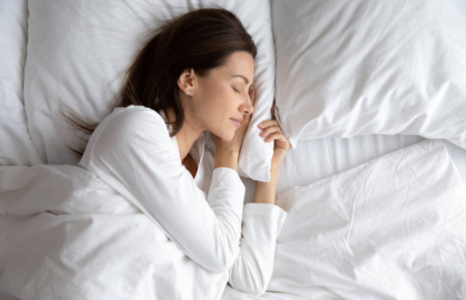Are You Making This Simple Post-Dinner Mistake That’s Ruining Your Sleep? Here’s What Experts Recommend Instead
By
Gian T
- Replies 0
We all know that a good night’s sleep is the secret ingredient to feeling our best—sharper minds, happier moods, and even healthier bodies. But let’s be honest: sometimes, getting those precious Zs feels like chasing a runaway chook around the backyard. You try the herbal teas, the fancy pillows, and even counting sheep (or, in our case, maybe kangaroos), but still find yourself tossing and turning.
So, what’s the missing piece? According to leading sleep expert Dr Katharina Lederle, it might be as simple as what you do after dinner—specifically, how you use light in your home.
The Surprising Power of Light After Dinner
Dr Lederle, who holds a PhD in Human Circadian Physiology and an MSc in Bioscience, recently shared her top tip with The Telegraph UK: after your evening meal, keep the lights as low as possible. That’s right—dim those lights and embrace the gentle glow of lamps or even candles if you’re feeling fancy.
‘After dinner I try not to turn on the lights,’ Dr Lederle explains. While she admits this is easier in the UK summer when it stays light late, she still keeps things dim in winter to avoid sending her brain the wrong signals. ‘Be mindful of how bright that light is in the evening and then consider a sunlight alarm clock to wake yourself up in the morning.’
Why does this matter? Our bodies are hardwired to respond to light. Bright lights in the evening can trick your brain into thinking it’s still daytime, making it harder to wind down and fall asleep. In fact, a 2014 study found that reducing exposure to light two to four hours before bedtime can help keep your body clock in sync, making it easier to drift off and stay asleep.
Screens: Friend or Foe?
Now, we know many of us love to unwind with a bit of telly or a movie after dinner. Dr Lederle says that’s okay—but if you can, stick to the TV rather than your phone or laptop. Why? The TV is usually further away from your eyes, so you’re exposed to less of that pesky blue light that can keep you awake. If you must use a device up close, consider turning on ‘night mode’ or using blue light-blocking glasses.
Morning Light: Nature’s Alarm Clock
Another tip from Dr Lederle: let the morning sun wake you up, not just your alarm clock. ‘Humans are seasonal and we have a body clock in our brain which needs sunlight to know it’s day time,’ she says. So, open those curtains as soon as you wake up and soak in the natural light—it’ll help set your body clock and boost your mood for the day ahead.
Breakfast and Coffee: Timing Is Everything
Dr Lederle also recommends eating an early breakfast to help your body know it’s time to start the day. And for all the coffee lovers out there (we see you!), there’s good news: you don’t have to give up your morning cuppa. Just try to finish your last cup by 2pm. That way, the caffeine will be out of your system by bedtime, helping you avoid restlessness and late-night tossing and turning.
Other Tips for a Restful Night

Have you tried dimming the lights after dinner, or do you have your own sleep secrets to share? Maybe you’ve found a particular routine that works wonders, or perhaps you’re still searching for that elusive perfect night’s sleep. We’d love to hear your stories, tips, and questions—pop them in the comments below.
Read more: Unlock the Secrets to Blissful Sleep Tonight with These Surprising Tips! Discover how NOW!
So, what’s the missing piece? According to leading sleep expert Dr Katharina Lederle, it might be as simple as what you do after dinner—specifically, how you use light in your home.
The Surprising Power of Light After Dinner
Dr Lederle, who holds a PhD in Human Circadian Physiology and an MSc in Bioscience, recently shared her top tip with The Telegraph UK: after your evening meal, keep the lights as low as possible. That’s right—dim those lights and embrace the gentle glow of lamps or even candles if you’re feeling fancy.
‘After dinner I try not to turn on the lights,’ Dr Lederle explains. While she admits this is easier in the UK summer when it stays light late, she still keeps things dim in winter to avoid sending her brain the wrong signals. ‘Be mindful of how bright that light is in the evening and then consider a sunlight alarm clock to wake yourself up in the morning.’
Why does this matter? Our bodies are hardwired to respond to light. Bright lights in the evening can trick your brain into thinking it’s still daytime, making it harder to wind down and fall asleep. In fact, a 2014 study found that reducing exposure to light two to four hours before bedtime can help keep your body clock in sync, making it easier to drift off and stay asleep.
Screens: Friend or Foe?
Now, we know many of us love to unwind with a bit of telly or a movie after dinner. Dr Lederle says that’s okay—but if you can, stick to the TV rather than your phone or laptop. Why? The TV is usually further away from your eyes, so you’re exposed to less of that pesky blue light that can keep you awake. If you must use a device up close, consider turning on ‘night mode’ or using blue light-blocking glasses.
Morning Light: Nature’s Alarm Clock
Another tip from Dr Lederle: let the morning sun wake you up, not just your alarm clock. ‘Humans are seasonal and we have a body clock in our brain which needs sunlight to know it’s day time,’ she says. So, open those curtains as soon as you wake up and soak in the natural light—it’ll help set your body clock and boost your mood for the day ahead.
Breakfast and Coffee: Timing Is Everything
Dr Lederle also recommends eating an early breakfast to help your body know it’s time to start the day. And for all the coffee lovers out there (we see you!), there’s good news: you don’t have to give up your morning cuppa. Just try to finish your last cup by 2pm. That way, the caffeine will be out of your system by bedtime, helping you avoid restlessness and late-night tossing and turning.
Other Tips for a Restful Night
- Create a bedtime routine: Try to go to bed and wake up at the same time each day, even on weekends.
- Keep your bedroom cool and dark: Blackout curtains and a fan can work wonders.
- Limit heavy meals and alcohol before bed: Both can disrupt your sleep cycle.
- Stay active during the day: A bit of exercise (even a gentle walk) can help you sleep better at night.
Key Takeaways
- A sleep expert recommends keeping lighting as low as possible after dinner to help prepare the body for sleep, especially by avoiding bright electric lighting in the evening.
- Reducing exposure to bright lights two to four hours before bedtime can help prevent your body clock from becoming misaligned, leading to better sleep quality.
- When watching TV or movies at night, it's better to use a television instead of a laptop or phone, as the screen is further away and less likely to affect your sleep.
- The expert suggests having your last coffee by 2pm to ensure caffeine is out of your system by bedtime, and also recommends using natural morning light to wake up rather than relying solely on an alarm clock.
Read more: Unlock the Secrets to Blissful Sleep Tonight with These Surprising Tips! Discover how NOW!








